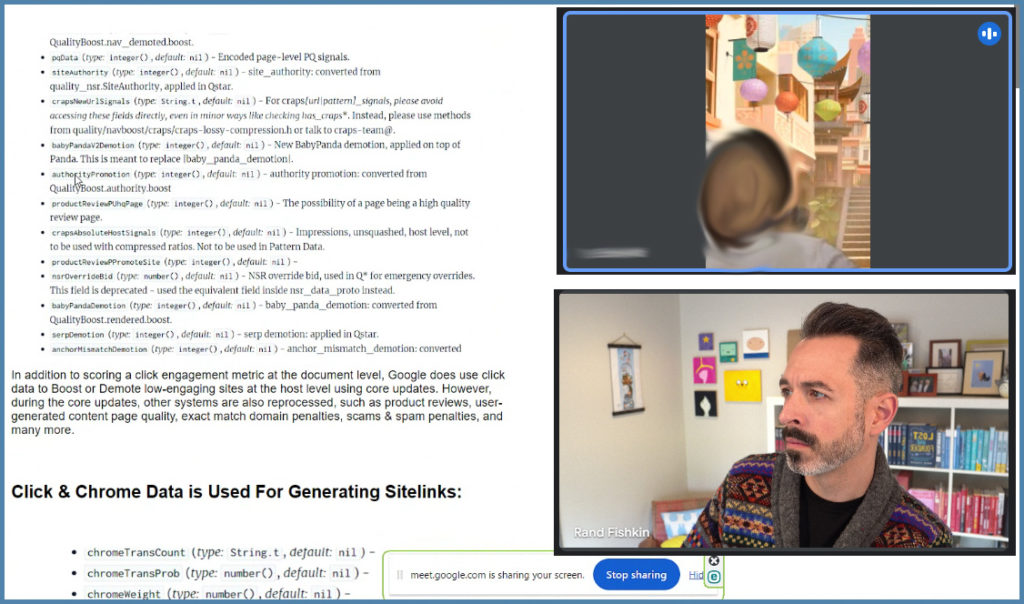- Content Forward: Thoughts from the Front Lines
- Posts
- Content Forward: The Big Google Search Leak
Content Forward: The Big Google Search Leak
SEOs Get a New Vocab, Should Writers Say No to Paid Tests?

Hello, fellow content peeps!
Another action packed week in the world of SEO and we’re back here again! Let’s get into it!
But first, a word from our sponsor.

Boost Your Marketing Performance with Anyword
Trusted by over 1M marketers, Anyword's AI generates optimized content trained on your marketing channels, with predictive scoring for any copy, channel, and audience – so you don’t have to guess what content will perform best.
The Great Google Search Leak: What Does This Mean?
If you’ve spoken to anyone in SEO this week, you’ve probably heard about the great Google Search Leak this week.
Internal documentation from a GitHub folder was ‘released’ by a Google insider and we’re now learning so much more about Google’s intricate algorithm.
While I haven’t personally had as much time as I would like to really dig into everything about this leak, I have been gathering all the coverage from SEOs and friends much smarter and more in the know than I will ever be.
And, I think it’s worthy of sharing many of this here, but we’ll get into what this ‘may’ mean to all of us in content.
Here’s a bit of a play-by-play of what’s been happening to catch you all up:
Sunday night, Rand Fishkin gets an anonymous email. We learn that there are over 14,000 ranking features exposed.
Rand writes about how he discovered this massive leak and shares his learnings as well, and yes, this is another article I suggest you spend some time reading.
Highlights from Rand’s analysis:
There are ‘whitelists’ in travel, Covid and Politics giving Google tons of power to demote or promote certain sites.
EEAT might not matter as much as some SEOs have said it does.
Most smaller or new publishers won’t see SEO gains as quickly as the larger, known publications.
On Monday, the Mike King article drops.
I think Mike has been on a weekly whirlwind since first publishing his thoughts on this, but this was one of the first articles to come out about this, it’s worth a read.
Highlights from Mike’s analysis:
We don’t know how any of these attributes are weighted or how important they are in practice.
There are numerous examples of how Google has mislead us publicly.
Google uses Chrome data. Not a big shocker here, but this is important to note because once again, this gives Google a huge advantage over competitors.
There is a Google sandbox, even if Google has told us there isn’t.
This leak is another indication that you should be taking in the inputs and experimenting with them to see what will work for your website.
Erfan Azimi, the anonymous source who shared the leak with Mike and Rand comes forward.
There is so much more to this and I have a feeling many of us in SEO will be chatting about this for a while.
We’re already getting a new SEO vocabulary.
Who knew we’d be talking about Twiddlers in SEO in 2024?
Twiddlers, Ascorer, Golden sites… that’s one of my favorite things that has come from this leak. We’re getting an entirely new SEO lexicon where we can start to come together as SEOs.
If you really want to go down a nerdy rabbit hole, I suggest you listen to this Twitter space from Kristen Ruby with some of the nerdiest SEOs around:
🚨Google Algorithm Ranking Factors Revealed. Tune in LIVE at 8 pm et tonight to discuss with @jeffrey_coyle@iPullRank@garrettsussman
— Kristen Ruby (@sparklingruby)
6:07 PM • May 28, 2024
Google finally responds to the leak.
““We would caution against making inaccurate assumptions about Search based on out-of-context, outdated, or incomplete information. We’ve shared extensive information about how Search works and the types of factors that our systems weigh, while also working to protect the integrity of our results from manipulation.”
Of course, this statement does little to establish any semblance of trust we may have clung to with Google.
We’ve been mislead and after this leak, it appears that Google trust is at an all time low amongst SEOs (at least anecdotally):
Only 10% of SEOs trust Google statements on search (it is the same percentage from 10 years ago) seroundtable.com/10-of-seos-tru…
— Barry Schwartz (@rustybrick)
11:21 AM • May 31, 2024
What Do We Do with This Information?
Google has been (at the very least) misleading us on a lot of the ranking factors we’ve experientially felt for a long time.
It should come as no surprise that Google has lost a lot of my confidence and trust this year after HCU and the core March updates.
What Google sayeth publicly is not what is actually true.
After this leak, I still have a lot of questions.
For example, we’re learning how important known authors, or known entities is in Google search.
I’ve felt this for quite a while but what does this mean for digital writers? What about subject matter experts who don’t have a strong digital presence? Are they less valuable in Google’s ranking system?
I think, for now, this is still largely an intellectual SEO exercise for me. I do think it may inform future SEO strategies, as more analyses come in and we can back this up with more actual data.
We still don’t have the full picture.
We don’t know how any of these factors are weighted in the algorithm, or how Google will weigh these, or use these moving forward.
Reading the Tea Leaves: The Findings Continue

I don’t want to downplay the significance of these leaked documents. I do think there are some inherently valuable insights here and I do not doubt their validity at all.
But, I’m a realist and someone who has been in on the ground floor of a lot of scrappy SEO and content projects over the years.
I know firsthand that intellectual SEO exercises are great, but what really matters is how we can implement it.
Isn’t that always the way?
I also know that we all come to these sorts of findings with our own inherent biases and experiences, budgets and motivations as well.
The SEOs that are all about link building are going to tell us how important link building is. And, yes, some will now talk more about link depth, user link data…
The semantic SEOs are going to find all the references that back up their strategies, and yes, some may tweak their or amplify their messages and use these leaked attributes as more ‘proof’ that this matters.
Will some try to manipulate SEO?
Of course.
But, again, I don’t think that’s anything new in this industry.
I am excited to keep reading others analysis, and from an SEO nerd and intellectual exercise, this is really fun.
Will I change my approach and strategy in SEO and content marketing?
Perhaps. But, then again, I don’t think that’s new either as we’ve talked about here many, many times. I think part of being a great SEO and content strategist is working with what you have (budget, resources) and figuring out the best strategy based on that.
Quick Hit Discussion: Should Great Writers Stop Doing Paid Test Articles?
This week, I hired a few new writers.
Part of our onboarding process has always been to start with one ‘test’ article for new writers.
Of course, we always pay full rates for these tests.
I spend a lot of time finding these writers. I expect that the majority of them should do really well, but over the years I’ve also learned that:
Writers may have stellar portfolios, and the right experience but still not ‘get’ our internal creative processes.
You don’t really know how much editorial got involved in their samples.
With the exception of a few really stellar, well known writers with star bylines, I have found that getting a new writer into our processes exposes many things. Not every writer can or should write for every publication either.
I’ve always been a ‘show up, do the work’ kind of gal and we’ll see if you’re a fit. That’s been my working thesis for a while.
But, I’ve been thinking a lot about our onboarding processes lately and then this LinkedIn post from Ashley Cummings caught my attention:
I agree with Ashley on a few things here. I do think it takes time for a writer to onboard a new client and I can truly understand the frustration of investing so much time at the front, just to get a one article commitment.
I’ve always encouraged our editors to spend more time with new writers. I get that there may be some additional back and forth discussions in the early days as writers figure out how we do things. My goal has always been to retain every writer we end up hiring, but not every writer gets hired.
It’s really tough, even with stellar writers to know exactly how they’ll do.
I love this discussion though! I’m always open to making our onboarding practices better.
Your turn: Would love your thoughts on this. Should writers turn down paid test articles?
Things to Read, Watch, and Ponder
▶️ My friend Jeff Coyle of Market Muse was super inspired by Google’s Content Warehouse API leak and wrote an in-depth blog post about it here.
▶️ Spencer and Jared weigh in on the leak in this week’s Niche Pursuits podcast. Watch that here!
▶️ Do higher content scores mean higher Google rankings? Ahrefs says, no. You can read their findings for yourself here.
▶️Mike King was on a media whirlwind this week, but he did take some time to share more of his thoughts on the criticisms of the Google Search leak with Search Engine Land here.
This edition is coming to your inboxes a bit late on this Friday night. There’s been a lot to get through with all of this.
I would love to know if the Google leak will change the way you create content?
Reply to this email and let me know!
Cheers! Amy
The Ultimate Content Collaboration Platform
Grappling with scattered feedback, disorganized workflows, and switching between too many tools?
Introducing Planable — the ultimate content collaboration tool for agencies and in-house marketing teams. With real-time collaboration and easy-peasy approval, you can create, plan, review, and approve all your awesome content in one space. And you get to organize your content by topic, campaign, brand, favorite color, or anything you please — just by using labels. Schedule your content, then track its performance with analytics and create beautiful reports for your clients. All in one place.
Join 5,000+ teams who trust Planable to streamline their content collaboration processes.
If you want to get into the weeds on these topics, here are some newsletters that I read regularly that I think you’ll enjoy:
|
|
|
|










Reply